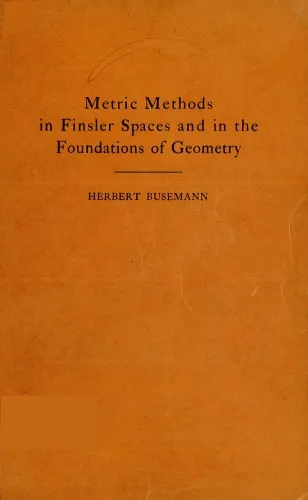Metric methods in Finsler spaces and in the foundations of geometry, by Herbert Busemann.
4.5
Reviews from our users

You Can Ask your questions from this book's AI after Login
Each download or ask from book AI costs 2 points. To earn more free points, please visit the Points Guide Page and complete some valuable actions.Introduction
Herbert Busemann's "Metric Methods in Finsler Spaces and in the Foundations of Geometry" stands as a cornerstone text in the field of differential geometry and mathematical understanding of Finsler spaces. This groundbreaking work explores the deep and often intricate relationship between metric methods and the geometry of Finsler spaces, offering profound insights into the structural underpinnings of space and distance. It also delves into the philosophical and mathematical foundations of geometry, bridging modern mathematical theory with classical concepts.
The book builds a rigorous framework for the study of metric spaces, particularly Finsler geometry, which generalizes the notions of distance found in Riemannian geometry. By employing an axiomatic and methodical approach, Busemann invites readers into a deep exploration of geometry that extends far beyond Euclid, presenting geometry as a living, evolving foundation for science and mathematics. Scholars, researchers, and students in mathematics and related disciplines will find this book indispensable in understanding geometry's evolution and its applications in other domains, including physics and optimization.
Detailed Summary of the Book
The book begins with an introduction to metric spaces and their fundamental properties, which sets the stage for discussing more advanced topics in Finsler and Riemannian geometries. Busemann explores the essential axioms that guide the development of distance and the idea of minimizing curves, which are foundational concepts in understanding geodesics. The book's treatment of Finsler spaces is meticulous, as it introduces directional metrics, norms, and curves with great precision and clarity.
In addition, the work investigates the foundations of geometry through a critical lens, analyzing how concepts such as symmetry, parallelism, and congruence arise from axiomatic principles. By revisiting classical geometry and expanding upon it with modern metric approaches, Busemann reveals the richness and flexibility of mathematical structures. Differentiating itself from purely theoretical works, the book also highlights real-world applications, with connections to optimization problems, variational calculus, and theoretical physics.
One of the most intriguing parts of the book is its treatment of non-Euclidean and generalized spaces, offering readers an opportunity to appreciate how geometry has evolved from flat, Euclidean paradigms into multifaceted systems suitable for modern physics and complex mathematical solutions.
Key Takeaways
Readers will leave this book with a comprehensive understanding of:
- The intrinsic properties of metric spaces and their applications in geometry.
- Foundational principles of Finsler geometry, including its distinction from Riemannian geometry.
- Generalized geodesics and the role of direction-dependent metrics in formulating distance and curvature.
- How mathematical axioms underpin modern geometry and shape its evolution.
- Applications in physics, optimization, and beyond, demonstrating the relevance of metric geometry in practice.
Famous Quotes from the Book
"Geometry is the art of reasoning well about spatial relationships; its modern evolution has far surpassed the constraints of Euclidean flatness."
"The axiomatic method in geometry is not merely a convenience but a necessity, illuminating the fundamental nature of distance and congruence."
Why This Book Matters
Busemann's work represents a watershed in the study of geometry, offering a bridge between classical Euclidean principles and the sophisticated, multidimensional constructs of modern mathematics. At its heart, the book emphasizes the power of the metric method, which has far-reaching implications in various fields of science and mathematics.
For mathematicians, this book provides a concrete and axiomatic approach to geometry that is both rigorous and enlightening. For physicists and engineers, it offers tools and methodologies to tackle complex problems involving space, curvature, and optimization. Finally, for students, it is a profound educational resource that deepens the understanding of fundamental geometric principles and demonstrates their evolution into modern theories, such as those needed for general relativity.
In a field often filled with abstraction and complexity, Herbert Busemann's clarity of thought and precise exposition make this book an essential read for anyone serious about understanding geometry's role in shaping both mathematics and the physical sciences.
Free Direct Download
You Can Download this book after Login
Accessing books through legal platforms and public libraries not only supports the rights of authors and publishers but also contributes to the sustainability of reading culture. Before downloading, please take a moment to consider these options.
Find this book on other platforms:
WorldCat helps you find books in libraries worldwide.
See ratings, reviews, and discussions on Goodreads.
Find and buy rare or used books on AbeBooks.


